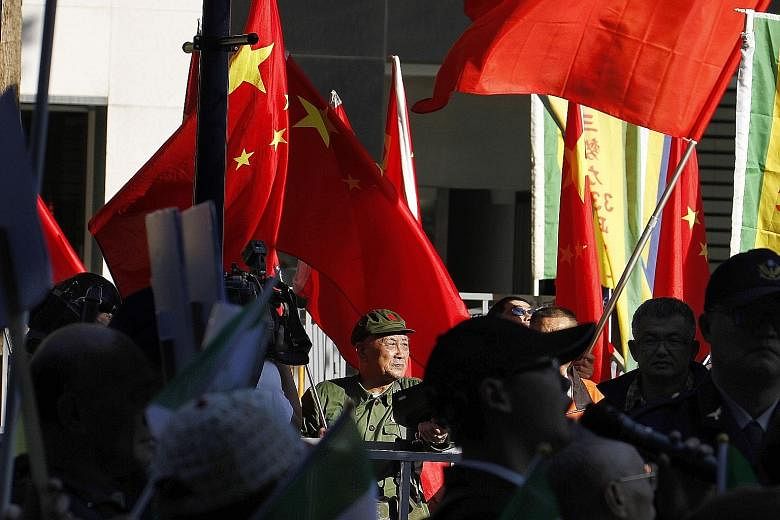There ought to be more than a few things in the newly passed Asia Reassurance Initiative Act that China would not be pleased with.
But the one that truly annoys Beijing is the United States' insistence on cosying up to Taiwan, long regarded by China as a breakaway province with no option but to return to the motherland.
On Wednesday, China's foreign ministry said it "resolutely opposed" the signing of the Bill, which calls for more official exchanges between the US and Taiwan and regular arm sales to the island, and had formally registered its displeasure with Washington.
"The Act has seriously violated the one-China principle and stipulations in the three China-US joint communiques, and bluntly interfered in China's domestic affairs," foreign ministry spokesman Lu Kang said at a news briefing.
In the communiques signed in 1972, 1979 and 1982, the US acknowledged and affirmed the one-China principle, although it also stated that Washington will maintain unofficial ties with Taiwan.
Just two days after US President Donald Trump signed the proposed Bill into law, his Chinese counterpart, Mr Xi Jinping, warned: China will not tolerate foreign meddling in the Taiwan issue and will resort to military force, if necessary.
The fact that China has chosen to make noise over Taiwan instead of the other portions targeting it in the Bill indicates Beijing's insecurities over the island, say analysts.
"From Beijing's perspective, continuing US support only emboldens the Taiwanese to stay firm in their rejection of what Beijing calls 'reunification' but what for most Taiwanese would be an annexation," said Mr Michal Thim, research fellow at the Association for International Affairs in Prague.
Even though the contents of the Bill are mostly reiterations of what the US has been saying about its Indo-Pacific strategy, Beijing will see this legal move as a concrete step by Washington to implement this much-talked-about game plan, says Associate Professor Li Mingjiang of the S. Rajaratnam School of International Studies.
"This kind of interpretation will certainly add to China's anxiety towards this emerging Indo-Pacific construct. For some time, many Chinese policy elites have been saying that this strategy is just a slogan without much substance, but, now that it has passed into law, it will change some of their thinking: that Americans mean business when they proposed the strategy," he said.
Aimed at containing China's growing influence in the region, the Act allows for US$1.5 billion (S$2 billion) to be spent every year for the next five years on US military, diplomatic and economic engagement and assistance in Asia.
It addresses, among other things, China's militarisation of the South China Sea, its alleged intellectual property violations and human rights abuses in Xinjiang.
"The main implication for China is that, despite its efforts, using both sticks and carrots, to weaken the US position in the region... the US is not going anywhere and it is not backing off from support to partners and allies in the region," said Mr Thim.
China experts do not believe this legislation will significantly alter the competitive dynamics between China and the US in the region and, even without this law, Washington will continue to take China to task for those alleged transgressions.
But the Taiwan issue is different. Prof Li said there is a sense now that China is creating conditions for unification through opening up dialogue with political forces in Taiwan.
"With the new American policy completely contrarian to China's new Taiwan policy objective, Beijing will be worried about this, and that Washington is intentionally playing the Taiwan card in US-China relations."


